Severe flooding threatens to undermine the country's food security, according to farmers and environmental groups, who today accuse the government of failing to address the effects of climate change on coastal and rural areas.
As gales swept southern and western parts of the UK, with already drenched counties bearing the brunt of the storms, it has emerged that parliament's select committee on the environment warned in a report last year that "the current model for allocating flood defence funding is biased towards protecting property, which means that funding is largely allocated to urban areas. Defra's [the Department of the Environment's] failure to protect rural areas poses a long-term risk to the security of UK food production, as a high proportion of the most valuable agricultural land is at risk of flooding."
"We need a response from government that recognises the importance for our long-term food security of safeguarding high-quality farmland," said Neil Sinden of the Campaign to Protect Rural England. "We need to view the countryside as more than a place for building, and value it for the food it provides."
Defra has estimated that 35,000 hectares of high-quality horticultural and arable land will be flooded at least once every three years by the 2020s. This could rise to around 130,000 hectares by the 2080s if there is no change to current flood defence provision.
Peter Kendall, chairman of the National Farmers Union, which has produced evidence showing that 58% of England's most productive farmland lies within a floodplain, said the floods were a wake-up call for a country that has "believed for too long that producing food wasn't a big issue".
"We are seeing more of these intense extreme weather events," Kendall said. "Climate change does now really challenge mankind's ability to feed itself."
He said much of the flooding was down to "almost a deliberate policy of neglect of the watercourses" that had seen the Environment Agency "putting birds first and people second", a reference to the agency's attempts to encourage more wetland areas in the UK to promote biodiversity.
His comments were the latest salvo fired at the agency's chairman, Lord Smith, who was defended robustly by wildlife charities. In a letter in the Observer, the heads of the RSPB, the Wildfowl and Wetland Trusts, the Wildlife Trusts and the Angling Trust, said: "Ultimately, it is governments that have set the policies that have hamstrung flood planning in some vulnerable areas: allowing homes to be built and failing to make both homes and farmland more resilient to floods. Cuts to the Environment Agency merely risk reducing it from a flood-management body to an emergency response service and making future floods even more damaging."
Whistleblowers within the agency told the Observer that frontline flood staff were being cut, despite Smith's pledges that reducing the agency's emergency response was a "red line" that could not be crossed.
"People need to be aware that some of the frontline staff are taking a big hit, particularly when we are facing some of the worst flooding ever seen in southern England," said one EA source. He said that, at the same time that frontline staff were being put onto 24/7 duty rotas, managers were being asked to cut staff by 13% across all regions. "This salami slicing approach is entirely wrong," he said.
"This government is steadily dismantling the nation's ability to tackle flooding and prepare for climate change," said Friends of the Earth's Guy Shrubsole.
An Environment Agency spokesman said: "The planned reductions in posts will not affect the Environment Agency's ability to respond to flooding incidents."
The government's response to the floods is threatening to damage the Tory brand in rural areas. Jeremy Browne, the Liberal Democrat MP for Taunton Deane, said that the Conservatives had left themselves open to criticism, having rebranded themselves as a "green" party, only to lose enthusiasm after a couple of years in office.
"People have good reason to believe that that was a fairly cynical exercise and that much of the party remains unconvinced of the need to have a coherent environmental policy," Browne said.
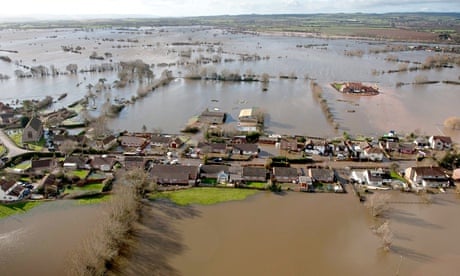
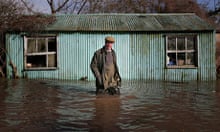


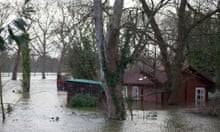
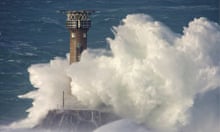
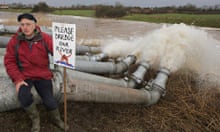
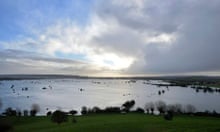
Comments (…)
Sign in or create your Guardian account to join the discussion